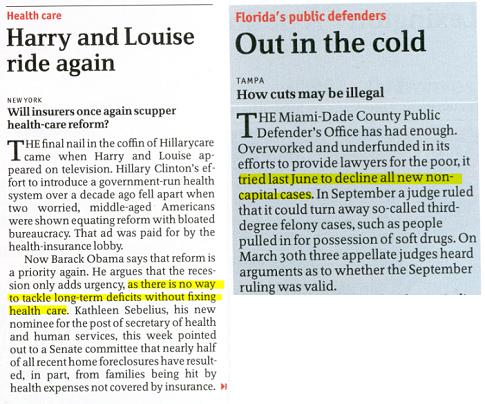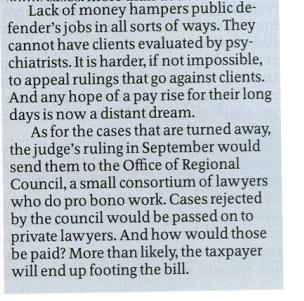Insurance Companies
Most Prescribed Drugs 2009: Post 1, JFK to SFO

Continue reading:
"Most Prescribed Drugs 2009: Post 1, JFK to SFO" ››

 Score: 13 (21 votes cast)
Score: 13 (21 votes cast)
What Healthcare Reform Means To Hospitals
Continue reading:
"What Healthcare Reform Means To Hospitals" ››

 Score: 0 (2 votes cast)
Score: 0 (2 votes cast)
Most Common Cause Of Bankruptcy Is Catastrophic Medical Bills
Continue reading:
"Most Common Cause Of Bankruptcy Is Catastrophic Medical Bills" ››

 Score: 2 (2 votes cast)
Score: 2 (2 votes cast)
They're Going To Get Paid No Matter What
Continue reading:
"They're Going To Get Paid No Matter What" ››

 Score: 2 (2 votes cast)
Score: 2 (2 votes cast)
No Bias Anywhere Here: The Future Of Bias
Continue reading:
"No Bias Anywhere Here: The Future Of Bias" ››

 Score: 3 (5 votes cast)
Score: 3 (5 votes cast)
Hospitals Accused of Patient Dumping To Pay
Continue reading:
"Hospitals Accused of Patient Dumping To Pay" ››

 Score: 0 (0 votes cast)
Score: 0 (0 votes cast)
One Should Note...



 Score: 0 (2 votes cast)
Score: 0 (2 votes cast)
This Is Why Medical Care Is Expensive
AUSTIN, Texas - Just nine people accounted for nearly 2,700 of the emergency room visits in the Austin area during the past six years at a cost of $3 million to taxpayers and others, according to a report.Activate populist outrage: ready, go!
The average emergency room visit costs $1,000. Hospitals and taxpayers paid the bill through government programs such as Medicare and Medicaid, Kitchen said.
After we get home from setting a few car fires, we can then ask the relevant question: what, exactly, do they mean by "cost?" Do they mean "cost," or do they mean "bill?"
Continue reading:
"This Is Why Medical Care Is Expensive" ››

 Score: 2 (2 votes cast)
Score: 2 (2 votes cast)
The British Model Of Cost Effectiveness Fails On Philosophy
Continue reading:
"The British Model Of Cost Effectiveness Fails On Philosophy" ››

 Score: 1 (1 votes cast)
Score: 1 (1 votes cast)
A Solution To The Pharma Problem
The problem so far is all arguments against Pharma (prices too high; no interest in making meds people need; no interest in cures, only maintenance treatments, etc, etc) fail because they are ethical arguments.
The problem and solution require our reluctant acceptance that the problem is an economic one, and only economics will solve it.
Continue reading:
"A Solution To The Pharma Problem" ››

 Score: 2 (4 votes cast)
Score: 2 (4 votes cast)
Pricing of Placebo Affects Efficacy
The question isn't why does this happen. The question is, why, in a free market, does the placebo have two different prices?
Continue reading:
"Pricing of Placebo Affects Efficacy" ››

 Score: 0 (0 votes cast)
Score: 0 (0 votes cast)
USAToday Says Drug Ads Are Smarter Than Doctors
There's an article in USA Today which says, essentially, that drug ads cause patients to ask for medications which they don't need, which are then given to them by their doctors. The key is that the doctors would not have given them these or any medications had the patient not asked.
The first question that can be asked is, ok, sure-- ads make patients ask for these medications. Why are the doctors succumbing to this pressure? It's a loaded concept, and I'm confident USA TODAY hasn't thought it through: are you suggesting that the doctors are prescribing a medication which is not indicated for the problem the patient describes? Or are you saying the doctor is a moron and doesn't think to recommend it in the first place? Or, are you saying the medicine isn't really needed, but the doctor is pressured to give it anyway?
Which brings us to our semiotics lesson for today: what do we mean be "need?"
Continue reading:
"USAToday Says Drug Ads Are Smarter Than Doctors" ››

 Score: 0 (0 votes cast)
Score: 0 (0 votes cast)
The Most Prescribed Drugs
You may as well find out what you're up to.
Continue reading:
"The Most Prescribed Drugs" ››

 Score: 1 (3 votes cast)
Score: 1 (3 votes cast)
What is Off Label Usage?
Some guys in Georgia do a massive study and discover that doctors use medications off label. They also determine that that's bad.
The real question is not why we use them off label, but why we persist in thinking that means anything.
First, the core problem with the paper, and the entire thesis of the validity of indications, is that the definition is recursive. A drug has an indication because it was found effective for a cluster of symptoms that we have defined as a disorder. This does not necessarily make the disorder valid, and it does not preclude the drug’s efficacy elsewhere.
In other words, it tells you what it is good for, but not what it isn’t good for.
So what is the value of an indication?
Can someone clarify the basis for the arbitrary distinction between “dementia related psychosis” and any other kind of psychosis? Is there new PET data that I missed that distinguishes the two?
Similarly, to say a drug “is” an antidepressant doesn’t mean it isn’t actually an antipsychotic. For example, what is it, exactly, about Prozac that makes it not an antipsychotic? The only legitimate answer is that when tested, Prozac didn’t work in psychosis—not that an antidepressant can’t be an antipsychotic. It is an artificial hierarchy that puts “antidepressant” below/weaker than “antipsychotic.” Try the reverse: can an antipsychotic be an antidepressant? Why is that easier to believe?
Thus, categorizing a medication based on an arbitrary selection of invented indications to pursue—and then restricting its use elsewhere—may not only be bad practice, it may be outright immoral.
I do not make the accusation lightly. Consider the problem of antipsychotics for children. It is an indisputable fact that some kids respond to antipsychotics. They are not indicated in kids. But don’t think for a minute there will be any new antipsychotics indicated for kids. Who, exactly, will pursue the two double blind, placebo controlled studies necessary to get the indication? No drug company would ever assume the massive risk of such a study-- let alone two-- in kids.
And which parents will permit their child in an experimental protocol of a “toxic” antipsychotic? Rich parents? No way. The burden of testing will be undoubtedly born by the poor—and thus will come the social and racial implications of testing on poor minorities. Pharma is loathed by the public and doctors alike, and the market for the drugs in kids is (let’s face it) is effectively already penetrated. There will not be any new pediatric indications for psych meds. Not in this climate. Think this hurts Pharma? It's the kids that suffer.
Lastly, the likely most common laments to this paper will be that it will be used by insurance companies to further restrict the practice of psychiatrists. Too bad. If psychiatrists cannot be bothered to learn how medications work and their appropriate usage, then unfortunately the State must intervene. It is, after all, their money, and it is not infinite. But restricting formularies based on "approved indications" (read: nothing) is not the solution. If the problem is economic (and it is) then you need an economic solution. And you're not going to like it.
-----------
Off-Label Use of Antidepressant, Anticonvulsant, and Antipsychotic Medications Among Georgia Medicaid Enrollees in 2001.” Hua Chen, Jaxk H. Reeves, Jack E. Fincham, William K. Kennedy, Jeffrey H. Dorfman, and Bradley C. Martin 67:6 2006.

 Score: 1 (1 votes cast)
Score: 1 (1 votes cast)
Healthcare Savings Accounts: Emphasis on Savings, Not Healthcare
A Healthcare Savings Account allows you to put aside $2700/yr, or $5040/yr/family, tax-free, for healthcare expenses. So what? So sit down.
First, a primer on deductible medical expenses. The IRS allows you to deduct the amount you spent on approved healthcare, minus 7.5% of your gross adjusted income. In other words, take your gross adjusted income (i.e. how much you make minus deductions) and multiply by .075. Subtract this amount from your total medical expenses: that's how much you can deduct.
You make $100,000. You incurred $4000 in medical expenses.
0.075 x 100000 = 7500. 7500-4000=3500. You can deduct 3500 from your taxes.
In the above example, if you only incurred $2000 in medical expenses, you can't deduct anything. Think of the 7.5% as a sort of-- deductible.
Healthcare Savings Accounts are different, and complementary. In the above example, the $4000 of medical expenses was (hopefully) made with money you earned and paid taxes on. If you're in a 35% tax bracket, you actually had to make $5400 to come up with that $4000. So you had to pay $1900 in taxes; and another $500 is a wash (7.5% deductible). So your illness cost you $1900 in addition to whatever the actual medical care cost.
But in George Bush's America, not only can you deduct medical expenses, but you can also put away money tax free for use in healthcare.
Many progressive types will complain that this doesn't solve the healthcare crisis, and they are right. But that's because HSA aren't about healthcare, they are about savings; they are another way of sheltering income from taxes. What they are, in effect, is 401(k)s.
Say you retire. You'll draw on your 401(k), which was funded by $14000/yr contributions, to pay for food, vacations, cable, whatever-- and healthcare. With an HSA, you can save $14000 AND $2700 a year, and use it as necessary when you retire. If you have medical expenses, you can just use the HSA money; the 401(k) money is for everything else.
So you can now save $16700 a year. AND you can deduct your medical expenses (above 7.5%)
And by the way, money in an HSA is fully investible, like a 401(k).
But what happens if you get hit by a truck (i.e. you have catastrophic medical expenses?)
Each HSA is linked with a "High Deductible Health Plan" (HDHP). They have high yearly deductibles of $1k-$2k, depending on the plan (which you can use saved HSA money to pay) but have maximum deductibles of about $5000 (or $10,000 per family.) In other words, you always have to pay at least $1000, but not ever more than $5000.
Each plan also has a monthly premium you have to pay (around $90) but about 60% is placed into your HSA (called "Premium Pass Through"-- you are in essence paying money to yourself, and the rest to the plan.) Each plan has different premiums, minimum and maximum deductibles, and penalties/enticements to use network services. These are summarized here, and in slightly more detail here.
Look, you can argue the social policy ramifications of this all day. But don't look a gift horse in the mouth.
By the way, you may be fascinated to know what is an allowable medical deduction.
- Abortions
- Acupuncture
- Home improvements for health reasons (elevators, widening a doorway,"lowering" kitchen cabinets)
- Fertility enhancement
- Lead paint removal
- Legal fees to get healthcare
- Medical conferences and transportation (if the conference is about your/your family's illness)
- Psychoanalysis
- Transportation to healthcare services (gas, bus, etc)
- Weight loss programs
- Wigs
- Vasectomies

 Score: 1 (1 votes cast)
Score: 1 (1 votes cast)
So Ends The Ochlocracy of Medicine: How To Fix Medicaid, Part 1
Preferred Drug Lists are the bane of the practicing clinician. Instead of, for example, a psychiatrist being allowed to prescribe any antipsychotic they think appropriate, Medicaid requires them to pick from a list of only three, "on formulary" agents.
Unfortunately for doctors, the logic is sound. Unless one can show that, for example, two antipsychotics do not have the same general efficacy or tolerability across a population, than an insurance company cannot be reasonably obligated to provide both, especially if one is cheaper.
Psychiatrists complain that some patients respond better to one drug than another, but while this may be true, there is no way to predict this; try the formulary ones first. But this is just a red herring. What angers doctors is that these restrictions are an intrusion on their practice. Doctors are better able to decide risks and benefits of a medication; which drugs to prescribe, and when.
This would be a great argument if it were true. It isn’t.
The truth is that doctors are woefully ignorant of the available scientific data. As with literature and philosophy, most doctors read about the science, not the actual science itself. In general, doctors prescribe medicines not based on careful review of data, but impulse, habit, and the recommendations of “thought leaders.” (Seriously. They’re actually called that.) Prescribing medicines based on partial information or clinical soundbites may feel like "the art of medicine" but it is, in fact, a random process. It is certainly no better than having an insurance company that did review the data tell you what not to prescribe.
They also tend to practice in a vacuum. A patient’s psychiatrist and cardiologist have no link. Are the treatments synergistic? Antagonistic? Neither fully know that the other is doing.
And so, because doctors are not rigorous about their practice, someone else has to be. One of the most outrageous way psychiatrists, and possibly other physicians, waste money is to use multiple medications for a situation that could well have been handled by one. “Polypharmacy” is so common that it is actually codified in treatment guidelines, despite—and this is where insurance companies go insane—there being practically no evidence that this is ever appropriate. Why combine two antipsychotics when maybe more of one will do? It may seem plausible that two are better than one, but they aren’t. It may be true that a patient needs two drugs; but you can’t assume that. The default practice cannot be augmentation. That has to be the maneuver of last resort.
Loose practice has caused the paradigm shift. It used to be that everyone deferred to the judgment of the wise physician. No more. Now, it’s incumbent upon us to show why we need to use a treatment, not for the insurance company to trust that we know best, that we made a careful analysis of the risks and benefits—because we didn’t. We complain that medicine is being assaulted in a million different ways—insurance companies, lawyers, alternative practitioners—but the reality is it is the exact same assault: we are no longer trusted to know best.
So what to do? There is a solution. But you’re not going to like it.
Link each Medicaid patient with a pharmacy budget per specialty—money controlled by the psychiatrist. A psychiatrist can use any drug, any dose, no restrictions, but only up to, say, $10 a day. Go.
There are numerous advantages.
First, there is cost control.
Second, Pharma will inevitably cut prices in order to compete.
Third, it gives doctors their autonomy.
Fourth: it will force doctors to pay very close attention to what is, actually, best practice. They will have to be more attentive to outcome studies. They will have to predict side effects: if you’ll need to add a second drug to counteract the side effects of the first, it may be better to use a completely different drug.
Fifth: They will use fewer medicines. Two is not always better than one; but it certainly is twice as expensive with twice as many side effects.
Sixth: Pharma no longer has incentive to create “me too” drugs. They are incentivized to come up with novel, even niche, treatments.
If you really want to tax the imagination of doctors, and force a level of rigor in medicine that has not been seen since, well, since never, create a global pharmacy budget per patient across all subspecialties. This way, if a psychiatrist wants to prescribe Zyprexa, he’s going to have to discuss with the cardiologist whether that is more cost effective than the Lipitor. Wow.
The unexpected benefit is that the two doctors have to communicate. Maybe a switch from Zyprexa could preclude the need for Lipitor? Maybe? Hello? Let this communication be billable to Medicaid. $100 per “consultation” is more than offset by the pharmacy savings. There are going to be some patients who actually do require more money, more medications. In that case, the doctor can petition for increased benefits. Doctors hate doing this. Too bad. The problem was created by doctors, not by pharmacists.
Finally, to bring Pharma into the game: the first 30 days of a prescription must be piad for by the Pharma company making the drug, i.e. samples or vouchers. This way, only the drug that actually works gets paid for by Medicaid. That's gold.
It’s worth stating, for the record, that I am opposed to government interference in my practice. I don’t particularly like lawyers, either. But the sad truth is that the state of psychiatry is the fault of psychiatrists, who have failed to take full responsibility for their own education and practice. To blame anyone else at this stage is totally disingenuous.

 Score: 9 (13 votes cast)
Score: 9 (13 votes cast)
For more articles check out the Archives Web page ››